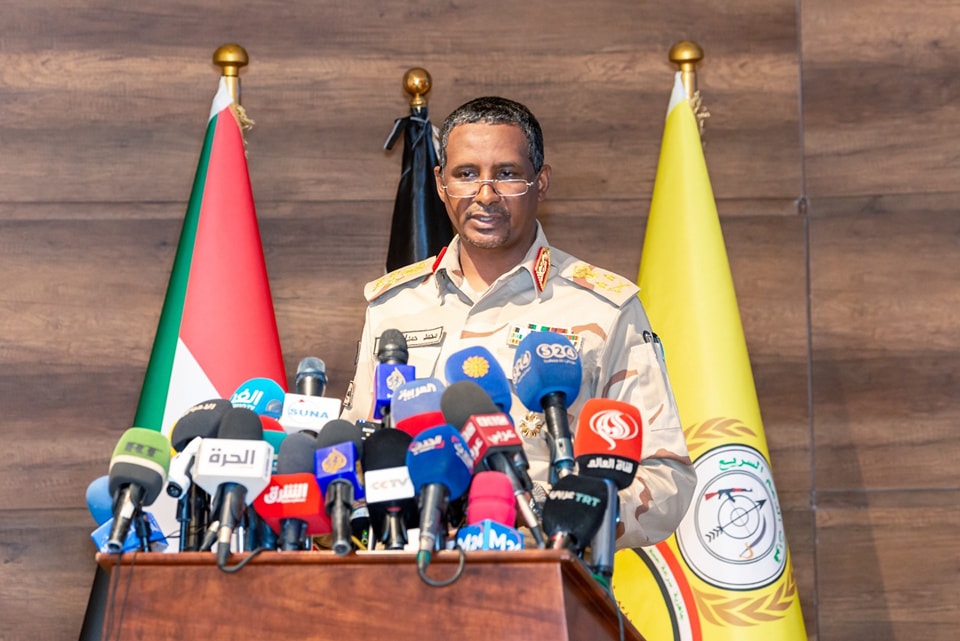Rapid Support Forces leader says Sudan military coup ‘was a wrong step’

Hemeti delivers a speech in Khartoum on February 19 this year (Rapid Support Forces)
KHARTOUM –
Lt Gen Mohamed ‘Hemeti’ Dagalo, Vice President of the Sovereignty Council and Commander of the paramilitary Rapid Support Forces (RSF), acknowledged that the military coup was wrong, indicating that the coup has become a gateway for affiliates of the former regime to return.
He accused employees of the defunct regime who returned to their positions after the coup d’état of October 2021 of seeking to drive a wedge between the army and the RSF.
These statements reportedly come against the background of the speeches of army commander Lt Gen Abdelfattah El Burhan in which he pledged his commitment to the formation of a civilian government and integrating the RSF militia into the Sudan Armed Forces (SAF).
Hemeti said in a press conference in Khartoum on Sunday that “days after the coup, it became clear that the coup was a wrong step.” These comments contradict his position on November 7, 2021, when he said that El Burhan had come “to correct the course of the people’s revolution and preserve the security and stability of the country.”
During the press conference, he said he will not hesitate “to return to the right track” and withdraw from political power and hand it over to a transitional civilian government “in agreement with El Burhan and the SAF leadership.”
The militia leader referred to his participation in the three conferences, on the removal of Al Bashir’s empowerment policies, the Juba Peace Agreement review conference, and the issue of eastern Sudan, recently organised by the civilian signatories of the Framework Agreement signed on December 5 by the military junta and civilian opposition groups.
He stressed the importance of moving forward with the current political process based on the Framework Agreement which will lead to the formation of a civilian government. “The ongoing political process is the only way out of the current crisis.”
He acknowledged the slow pace of the political process. “The time has come to reach a final political solution and for the military institution to return to the barracks and devote itself to its tasks.”
Hemeti called on the international community to provide the necessary support to the upcoming civilian government. He said he is ready for constructive relations with the international community and the region, and to avoid any relations that affect peace and international security.
He accused “elements of the defunct regime of seeking to drive a wedge between the Sudanese army and the RSF,” telling them to “remove your hands from sedition in the military and civilian establishment, in order to achieve the stability of the country.” Hemeti affirmed his commitment to the stipulations of the Framework Agreement by “merging the RSF, according to specific schedules, into a reformed and modernised security and military institution that would stay clear from politics and economy.”
“The SAF will not become an instrument for a party or another political group, as they are owned by the Sudanese people.”
Following the military coup of October 25, members of the Al Bashir regime who were dismissed during the government of PM Abdallah Hamdok (2019-2021), were given the opportunity to return to their former positions, including the judiciary. Many practices from the Al Bashir era reappeared in the country. In November last year, El Burhan himself warned the former ruling National Congress Party (NCP) not to interfere with the army or in politics, though his speech was dubbed “political manoeuvring” by critics.
Hemeti is the leader of Sudan’s most infamous and notorious paramilitary. The RSF is widely believed to be responsible for atrocities in the Kordofan and Darfur regions in the past years and is also widely condemned for their role in the October 25 military coup and subsequent violence against pro-democracy protesters.











 and then
and then